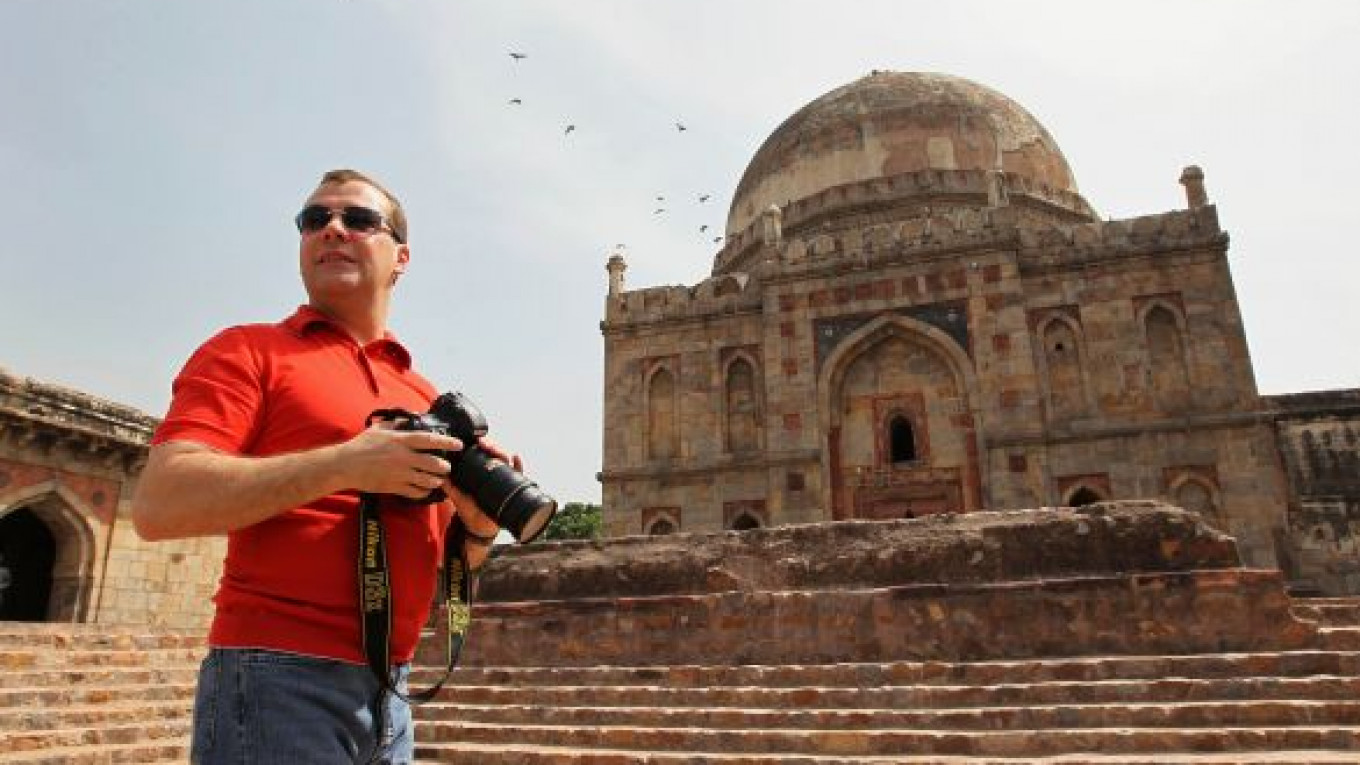The BRICS group of emerging market nations must increase transactions in local currencies between them, President Dmitry Medvedev said Thursday during a summit of the group in New Delhi.
Medvedev also said the global financial system did not yet reflect the new role that the BRICS — Brazil, Russia, India, China and South Africa — and other states with developing markets are playing.
Earlier on Thursday, the chairman of Russia's largest state development bank said Moscow and Delhi would switch to trading in domestic currencies in three years.
"With China it took us three years to [evolve] from initial conversations to trading in local currencies," VEB chairman Vladimir Dmitriyev told reporters on the sidelines of the summit.
"I think we will meet similar terms with India," he said.
The announcement comes hours before the emerging economies, which are trying to bolster their global influence to reflect their growing economic clout, were to sign an agreement to exchange loans in national currencies.
The agreement will be to use bills of credit as a key instrument, Dmitriyev said, a form in which "partners trust each other."
Dmitriyev said Russia was considering switching to trading in local currencies with other BRICS partners, which could take some time because of certain technical conditions.
"Switching to national currencies has a lot of technical conditions to be complied by each country," he said. "We will also have to synchronize national banking legislations [to make trade functional]."
The leaders of five of the world's fast-rising powers agreed Thursday to move toward creating a new development bank that would improve access to capital for poor nations.
Accusing current international institutions of failing to lift up poor countries, the BRICS group asked their finance ministers to investigate setting up a development bank like the World Bank or Asian Development Bank that they would back.
The five countries represent 45 percent of the world's population, a quarter of its land mass and a quarter of its economy at $13.5 trillion. World Bank president Robert Zoellick, underscoring the importance of the emerging world's biggest economies with his own trip to India, welcomed the idea of a new development bank.
"We will be looking forward to working with it to see how we can leverage one another's strength," he said while traveling in the eastern state of Orissa, according to the Press Trust of India. "It will complement the type of work we do."
Meanwhile, India's BSE, Asia's oldest stock exchange, will list benchmark equity-index futures contracts from Brazil, Russia, China and South Africa on March 30, according to a statement on the BSE website.
The five bourses will cross-list futures contracts on Brazil's Bovespa Index, Russia's MICEX Index, the BSE India Sensitive Index, Hong Kong's Hang Seng Index and the Hang Seng China Enterprises Index, and South Africa's JSE Top40 Index, according to the statement. South Africa's JSE will list options on the benchmark indexes of the other four exchanges.
The Indian bourse will waive transaction charges for trades done on the derivatives contracts until Sept. 30, according to its statement.
(Reuters, Bloomberg, AP)
A Message from The Moscow Times:
Dear readers,
We are facing unprecedented challenges. Russia's Prosecutor General's Office has designated The Moscow Times as an "undesirable" organization, criminalizing our work and putting our staff at risk of prosecution. This follows our earlier unjust labeling as a "foreign agent."
These actions are direct attempts to silence independent journalism in Russia. The authorities claim our work "discredits the decisions of the Russian leadership." We see things differently: we strive to provide accurate, unbiased reporting on Russia.
We, the journalists of The Moscow Times, refuse to be silenced. But to continue our work, we need your help.
Your support, no matter how small, makes a world of difference. If you can, please support us monthly starting from just $2. It's quick to set up, and every contribution makes a significant impact.
By supporting The Moscow Times, you're defending open, independent journalism in the face of repression. Thank you for standing with us.
Remind me later.






